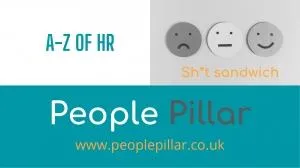Blog

S is for...
There are times that you need to consider suspension and consider is the key word in that sentence. Just because somebody does something wrong (even if it is pretty bad and may be considered gross misconduct) it still doesn’t mean that you should automatically suspend someone.
Here are some examples which might mean that suspension is necessary pending the outcome of an investigation:
where relationships have broken down
in cases where serious misconduct has been alleged, and which, if proven, would result in summary dismissal. For example theft or bribery
where there are grounds to believe that the employee might deliberately cause damage if they remained in the workplace
where the employee's continued presence at work might prejudice the investigation in some way
where the employee has acted in a violent manner or has threatened violence
where the employee has been accused of serious bullying or harassment
There are occasions when you may need to act straight away if the allegation is really serious and suspend the employee especially if you believe that there is a risk of further misconduct or interference in the investigation.
The manager should also consider alternatives to suspension, for example temporarily relocating the employee or assigning new duties to them if possible.
Suspension should however be considered as a last resort; the matter should be investigated ASAP and the suspension should be regularly reviewed. Although suspension will be on full pay, and is not a disciplinary sanction, it is a fundamentally negative experience for the member of staff and should be kept to as short a duration as possible.
Don’t let your business become one of the horror stories where the employee is out of sight, out of mind!!
Settlement agreements
Termination agreements, compromise agreements, non-disclosure agreements (NDAs), mutually-agreed resignations, ex-gratia payments, golden goodbyes or gagging clauses. All of these are essentially legally binding contracts which stop an employee bringing a claim against an employer. The correct term however, is settlement agreement.
They are used when an employee and an employer need to ‘part company’ and go their separate ways on agreed terms and usually includes a termination payment which could be notice pay, a tax free sum, redundancy, holiday, bonus and other sums.
In exchange, the employee gives up their right to take their employer to an Employment Tribunal.
So why use them?
They can be used to settle a case that is already working its way through the Tribunal system.
They are often used to avoid lengthy, drawn out performance, disciplinary or redundancy processes.
The other time they can be used is when an employee has a dispute with the employer and the settlement agreement is a way of closing down the dispute.
Some employers use them routinely to be overly cautious, even where there is no dispute or risk of a claim as they can be a way of ensuring no future claim (especially if a large termination payment has already been made e.g. after a redundancy process).
However, the employee is under no obligation to accept a settlement agreement and they can only be finalised if independent legal advice has been sought.
Usually a settlement agreement includes some of these terms (there are others as well):
Termination Date
Reason for termination: sometimes this may be stated as a “mutual agreement”
Compensation: A key part of the agreement. The first £30,000 of any compensation under the agreement can usually be paid free of deductions for tax or national insurance contributions. It is also important that there is a timeline for payment of this sum.
Tax indemnity: This means that the employee is responsible for the payment of any tax and national insurance should HMRC determine that tax should have been deducted.
Notice: The settlement agreement will set out what notice the employee is entitled to, including whether the employee has to work that notice or not. Usually when you are considering a settlement agreement, pay in lieu of notice (PILON) is wrapped up in the agreement.
Payments up to the Termination Date: The settlement agreement will also include what other payments will be paid i.e. salary, accrued holiday, benefits, bonus and outstanding expenses up to the termination date.
Pension
Return of employer’s property: An employee will normally be required to return all company property. If anything different is agreed and the employee is being allowed to retain any property, it should be detailed in the settlement agreement.
Waiver of claims: This is the main reason why an employer considers a settlement agreement as it is all about making sure that the employee cannot make future claims against the employer. There are however some exception to that. An employer cannot, ask an employee to waive their right to claim for any personal injury which they were not aware of at the date of signing of the agreement.
Reference: As an employer you are under no obligation to provide a job reference. However, it is common practice to have an agreed reference that will be used in future. Sometimes this can become a big sticking point for the employee as it still needs to be factual.
Confidentiality: This clause prevents the employee from discussing the terms of the settlement agreement and, in some cases, the circumstances surrounding it.
Non-derogatory clauses: There will usually be a clause which prevents both the employee AND the employer from making derogatory remarks/statements about each other to a third party.
Restrictive covenants: Where an employee has restrictive covenants in their contract, these will need to be re-confirmed in the settlement agreement.
Breach of the agreement: This clause states that if an employee breaches the settlement agreement, they will have to repay some or all of the payments they have received.
Legal fees: Most employers agree to pay a contribution towards the employee receiving legal advice to review the settlement agreement (although they are not legally obliged to make this payment). This is usually a payment between £250 and £500 plus VAT.
If you have found yourself in a sticky situation and need some advice on settlement agreements, get in touch today.
The Sh*t Sandwich
Do you have someone in your team who isn't performing? Have you ever tried to give someone some constructive feedback by hiding it in between two bits of nice feedback (hence the term sh*t sandwich). The message gets lost, the employee comes away none the wiser and you feel frustrated as the poor performance continues despite you ‘tackling it!!’
Dealing with poor performance is tough. It isn’t a nice thing for a business owner to have to do.
However, you need to have that difficult conversation otherwise nothing will change and you will end up even more cheesed off. Therefore, pull on your big girl (or boy) pants, take a deep breathe and tackle it. Here is what to do:
1) Can I be frank? This is the tough bit that most people make fluffy. You need to be open and honest with the employee. Try and keep the emotion out and be really clear about what the issue is with examples and any evidence.
2) Don’t just summarise the issues i.e you’re not very good at doing presentations or you’re always late. Be specific.
3) Once you have stated the issues, now is the time to stop talking. Give the employee a chance to have their say. Encourage them to discuss what they are finding difficult.
4) You then need to have a plan of action. Be clear about what needs to change, how it needs to change and by when.
5) Put it in writing - if you write it down, it is more likely to happen! You also have an audit trail of what was agreed if you need it.
6) You need to review progress on a regular basis
Managing performance isn’t about punishment. It is about genuinely trying to improve performance. However, if things aren’t improving or aren’t improving as quickly as you would like or the age old favourite, you see an improvement and then it slips back, it’s time to give me a call so we can discuss the next steps.
If you find this article useful, consider sharing it with others
Happy Customers

Say hello

©2021 - 2024 People Pillar HR | Privacy Policy

